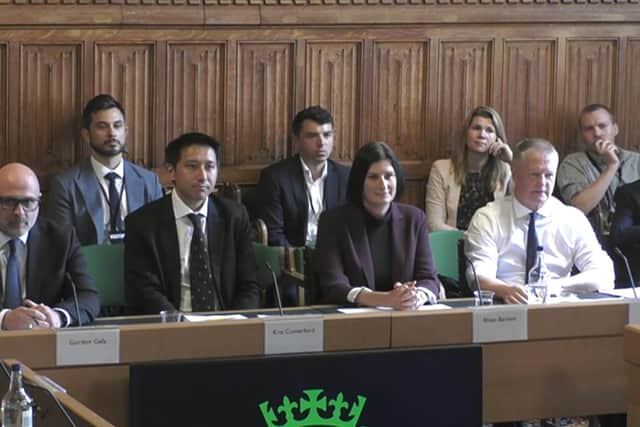Supermarket bosses deny profiteering as costs continue to soar
Amid persistent allegations of “profiteering” during the price squeeze, the heads of the four largest supermarkets insisted they were passing on any marginal price reductions to their customers, and that the market remained highly competitive.
Last week the Office for National Statistics published the latest inflation figures showing that food price rises have eased slightly but remain at a stubbornly high 18.4 per cent, compared to this time last year.
Advertisement
Hide AdAdvertisement
Hide AdTesco’s commercial director Gordon Gafa told the Business and Trade Committee yesterday that profits at his company had fallen.


Addressing Mr Gafa, committee chairman Darren Jones said: “According to your 2018/19 annual accounts you made a profit of 1.6 billion and in 2021/2022 accounts you made a profit of 2.03 billion. So you’ve increased your profit quite significantly there, haven’t you?”
Mr Gafa replied: “As I say, profits year-on-year for the group are down, we have sold more year on year and we have made less.
But Mr Jones pressed: “How can it be possible that you are making hundreds of millions of pounds in additional profit?”
Advertisement
Hide AdAdvertisement
Hide AdMr Gafa replied: “I’m referring to our latest accounts for 2022/23 so that may be the discrepancy.”
Tesco – which employs more than 300,000 people – saw its profits drop to £1 billion in the year to February 2023, from £2.03 billion in the previous year.
Sainsbury’s told the committee it was not passing all the costs of inflation in its supply chain to customers, as it too was quizzed over whether supermarkets are profiteering amid rampant food inflation.
In April, Sainsbury’s revealed that statutory profits tumbled by more than half to £327 million, while underlying profits were also 5 per cent lower year-on-year.
Advertisement
Hide AdAdvertisement
Hide AdIt said this was partly driven by a £560 million investment into lower pricing to keep shoppers coming into its stores.
Meanwhile Asda’s earnings declined by almost a quarter to £886 million in 2022, while Morrisons’ adjusted earnings fell by 15 per cent to £828 million over the year to October 30, from £975 million in the previous year.
Rhian Bartlett, food commercial director at Sainsbury’s, told the committee: “We are acutely aware of the cost-of-living impact on our colleagues and how difficult they are all finding it right now.
“We’ve spent £560 million on keeping prices low, battling inflation and are doing absolutely everything we can to keep prices as low as possible for customers.
Advertisement
Hide AdAdvertisement
Hide Ad“In the most recent year we made lower profits, at £690 million – input costs are not being fully passed through to our shelf prices.
“We’ve submitted lots of detail on that to the CMA (Competition and Markets Authority) and have had good discussions with the CMA.
“We are inflating behind our input costs and inflating wherever possible behind the market.”
The prickly issue of a voluntary price cap on basic food items - floated by the Government in recent weeks - was also discussed, with supermarket bosses saying it could be counter-productive.
Advertisement
Hide AdAdvertisement
Hide AdAsked about the speculation, Ms Bartlett said: “This is fiercely competitive as a market.
“We’re generally considered one of the most competitive food markets in the world. I’m not sure what price caps would add to that process, other than bureaucracy.
“Where we’ve seen them applied in France and so on it can have unintended consequences – of selling out and other prices moving up and down.
“So I think this market self-regulates to a positive extent, so we wouldn’t be in support of price caps.”
Comment Guidelines
National World encourages reader discussion on our stories. User feedback, insights and back-and-forth exchanges add a rich layer of context to reporting. Please review our Community Guidelines before commenting.
